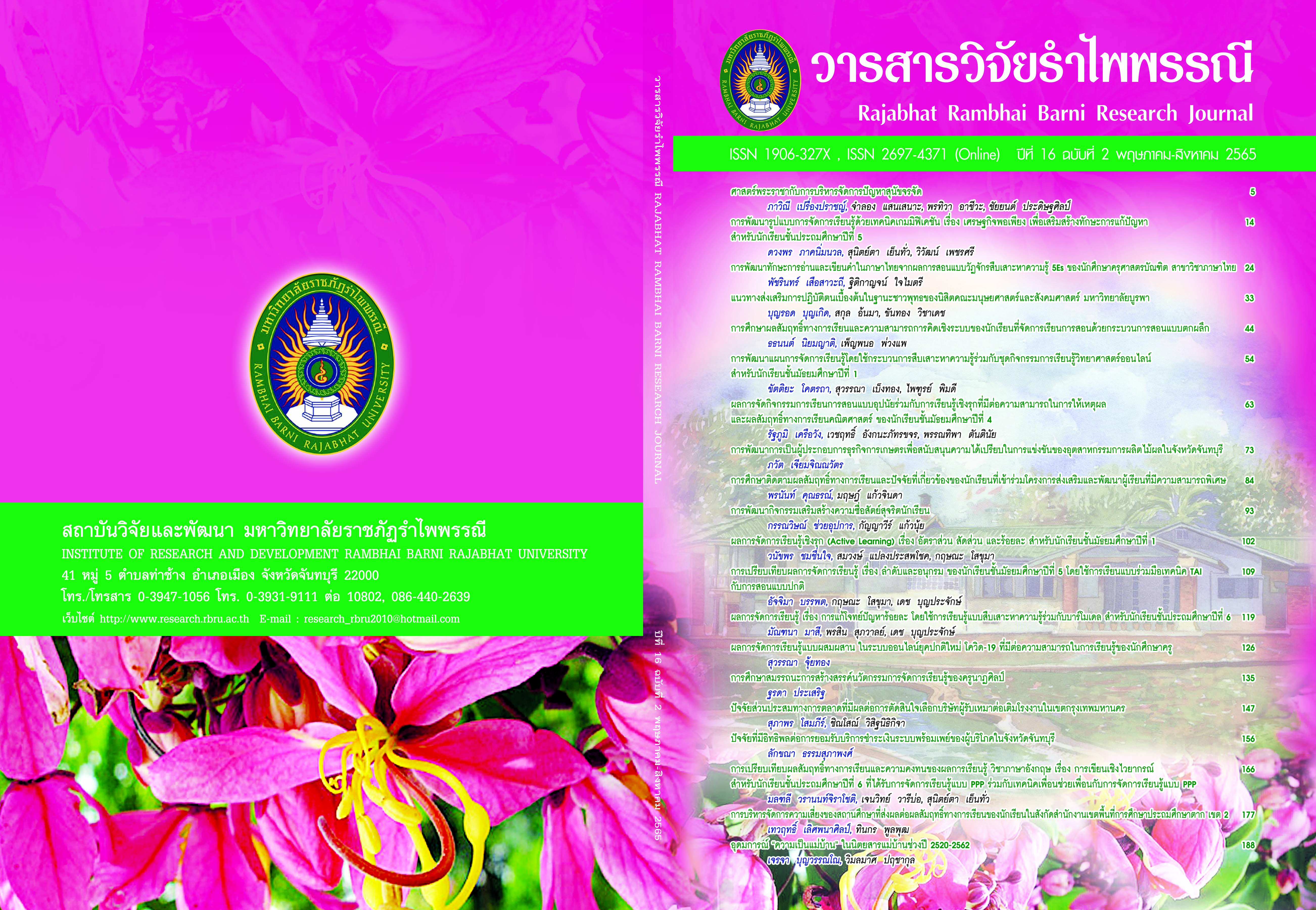การพัฒนาการเป็นผู้ประกอบการธุรกิจการเกษตรเพื่อสนับสนุนความได้เปรียบในการแข่งขันของอุตสาหกรรมการผลิตไม้ผลในจังหวัดจันทบุรี
Main Article Content
บทคัดย่อ
การพัฒนาการเป็นผู้ประกอบการธุรกิจการเกษตรเป็นองค์ประกอบสำคัญในการขับเคลื่อนเศรษฐกิจท้องถิ่นให้เติบโตอย่างยั่งยืน ผู้ประกอบการธุรกิจการเกษตรนอกจากต้องทำหน้าที่ในการผลิตสินค้าเกษตรแล้ว ยังต้องเป็นผู้ที่สามารถตอบสนองต่อตลาดและสร้างสรรค์ผลิตผลให้มีคุณค่าเพิ่มขึ้น การวิจัยนี้มีวัตถุประสงค์เพื่อศึกษาองค์ประกอบของการเป็นผู้ประกอบการธุรกิจการเกษตร และเพื่อกำหนดกลยุทธ์ในการสร้างความได้เปรียบในการแข่งขัน กรณีผู้ผลิตไม้ผล จังหวัดจันทบุรี วิธีวิจัยเป็นการวิจัยเชิงคุณภาพ เก็บรวบรวมข้อมูลจากผู้ผลิตไม้ผล และผู้เชี่ยวชาญที่มีประสบการณ์โดยตรงเกี่ยวกับผู้ผลิตไม้ผล โดยการสัมภาษณ์เชิงลึก และการสนทนากลุ่ม วิเคราะห์ข้อมูลด้วยวิธีวิเคราะห์เนื้อหา และการวิเคราะห์กรอบงาน
ผลการวิจัยพบว่า องค์ประกอบที่แสดงถึงความสามารถในการเป็นผู้ประกอบการธุรกิจการเกษตร ได้แก่ 1) ข้อมูลพื้นฐานทั้งปัจจัยส่วนบุคคลและปัจจัยเศรษฐกิจสังคม 2) คุณลักษณะการเป็นผู้ประกอบการ ในด้านการคิดเชิงบวก การแสวงหาความรู้ การคิดเชิงสร้างสรรค์ และการมุ่งความยั่งยืน และ 3) สมรรถนะการเป็นผู้ประกอบการ ในด้านการจัดการทรัพยากรภายใน การจัดการการตลาด และการจัดการความเสี่ยง การพัฒนาความสามารถในการเป็นผู้ประกอบการธุรกิจการเกษตรเป็นพื้นฐานสำคัญในการสร้างความได้เปรียบในการแข่งขัน ซึ่งจะช่วยให้ผู้ผลิตไม้ผลดำเนินกลยุทธ์การแข่งขันอย่างมีประสิทธิผล ทั้งกลยุทธ์ด้านนวัตกรรม ต้นทุน ความเฉพาะ ความสมดุล และความสัมพันธ์
Article Details

อนุญาตภายใต้เงื่อนไข Creative Commons Attribution-NonCommercial-NoDerivatives 4.0 International License.
เอกสารอ้างอิง
กระทรวงเกษตรและสหกรณ์. ยุทธศาสตร์การวิจัยด้านการเกษตรและอุตสาหกรรมการเกษตร กระทรวงเกษตรและสหกรณ์ (พ.ศ. 2558-2564) [online]. สืบค้นจาก https://tarr.arda.or.th/static2/docs/str_research.df. 2558.
ณัฐชุดา เดชพ่วง และ กนกพร ชัยประสิทธิ์ (2561). ความสัมพันธ์ของปัจจัยภายในและปัจจัยภายนอกประเทศที่มีผลต่อการส่งออกทุเรียนไปสาธารณรัฐประชาชนจีน. วารสารวิชาการมหาวิทยาลัยอิสเทิร์นเอเชีย ฉบับสังคมศาสตร์และมนุษยศาสตร์, 8(1): 333-340.
นิพนธ์ พัวพงศกร. บทบาทของเทคโนโลยีและนวัตกรรมในการขับเคลื่อนการพัฒนาการเกษตรไทย: อะไร คือ กุญแจสำคัญ. การสัมมนาวิชาการเรื่อง ดังเครื่องการพัฒนาการเกษตรไทยด้วย. [online]. สืบค้นจาก https://www.pier.or.th/wp-content/uploads/2018/04/Workshop2018_Agri_Nipon_session1.pdf. 2561.
สมทบ แก้วเชื้อ บัณฑิต ผังนิรันดร์ และธนพล ก่อฐานะ (2562). ปัจจัยแห่งความสำเร็จของผู้ประกอบการธุรกิจออนไลน์ในยุคดิจิทัล. วารสารวิชาการเทคโนโลยีอุตสาหกรรม, 15(2): 33-44.
สมนึก เอื้อจิระพงษ์พันธ์ พักตร์ผจง วัฒนสินธุ์ อัจฉรา จันทร์ฉาย และประกอบ คุปรัตน์ (2553). นวัตกรรม: ความหมาย ประเภท และความสำคัญต่อการเป็นผู้ประกอบการ. วารสารบริหารธุรกิจ คณะพาณิชยศาสตร์และการบัญชี มหาวิทยาลัยธรรมศาสตร์, 33(128): 49-65.
เสาวลักษณ์ พันธบุตร (2560). อยู่อย่างคนร่วมสมัยในยุคดิจิทัล. วารสารนวัตกรรมสื่อสารสังคม. 5(2): 161-167.
สำนักงานนโยบายและยุทธศาสตร์การค้า. New Equilibrium of New Normal “ถอดบทเรียนจุดสมดุลใหม่หลังวิกฤติเศรษฐกิจ 2008 สู่แนวทางการค้าหลังโควิต-19”. [online]. สืบค้นจาก https://docs.google.com/viewer?a=v&pid=sites&srcid=ZnRpa20uY29tfGRlbW9rbXxneDo0NjEyNWU2NmZiNjZmOWNj. 2563.
สำนักงานสภาพัฒนาการเศรษฐกิจและสังคมแห่งชาติ. ตารางผลิตภัณฑ์ภาคและจังหวัด แบบปริมาณลูกโซ่ อนุกรมเวลา 2538-2560 GPP CVMs Time Series Data 1995-2017 (Excel File). [online]. สืบค้นจาก https://www.nesdb.go.th/main.php?filename=gross_regional 2562.
Afzal, M. N. I., Mansur, K. and Manni, U. H. (2018). Entrepreneurial capability (EC) environment in ASEAN-05 emerging economies: An empirical approach. Asia Pacific Journal of Innovation and Entrepreneurship. 12(2), 206-221.
Ahmad, N. & Hoffman, A. (2007). A Framework for Addressing and Measuring Entrepreneurship. Paris: OECD Publishing.
Ahmad, N. and R. Seymour (2008), Defining entrepreneurial activity: definitions supporting frameworks for data collection, In OECD Statistics Working Papers, 2008/01. Paris: OECD Publishing.
Allen, K. R. (2016). Launching New Venture: An Entrepreneurial Approach. (7th ed.) Boston: Houghton Mifflin.
Apiratikorn, S., Sdoodee, S., Lerslerwong, L. and Rongsawat, S. (2012). The impact of climatic variability on phenological change, yield and fruit quality of mangosteen in Phatthalung province, Southern Thailand. Kasetsart Journal (Natural Sciences). 46: 1-9.
Bacigalupo, M., Kampylis, P., Punie, Y., and Van den Brande, G. (2016). EntreComp: The Entrepreneurship Competence Framework. Luxembourg: Publication Office of the European Union.
Bujor, A. & Avasilcai, B. (2016). The creative entrepreneur: a framework of analysis. Procedia-Social and Behavioral Sciences. 211(2016): 21-28
Chaihanchanchai, P. & Anantachart, S. (2019). Through the looking glass: Understanding Thai academics’ viewpoints on integrated marketing communications. Kasetsart Journal of Social Sciences. 40: 402-419.
Chepurenko, A. (2015). Entrepreneurship Theory: New Challenges and Future Prospects. Foresight-Russia. 9(2): 44-57.
Dess, G., McNamara, G., & Eisner, A. (2016). Strategic Management: Creating Competitive Advantage. (8th ed.). New York: McGraw-Hill.
Jeffs, C. (2008). Strategic management. Los Angeles; London: SAGE.
Ji, C., Chen, Q. and Zhuo, N. (2020). Enhancing consumer trust in short food supply chains: The case evidence from three agricultural e-commerce companies in China. Journal of Agribusiness in Developing and Emerging Economies. 10(1): 103-116.
Kahan, D. (2012). Entrepreneurship in Farming. Rome: Food and Agriculture Organization of the United Nations.
Khanal, A. R. (2020) Interlinked diversification strategies: evidence from the US farm business households. Journal of Agribusiness in Developing and Emerging Economies. 10(3): 253-268.
Kumar, S. & Ali, J. (2010). Indian agri-seed industry: understanding the entrepreneurial process. Journal of Small Business and Enterprise Development. 17(3): 455-474.
Lans, T., Seuneke, P. and Klerkx, L. (2013). Agriculture entrepreneurship. In Llias G. Carayannis (Eds.), Encyclopedia of Creativity, Invention, Innovation and Entrepreneurship. Verlag Berlin Heidelberg: Springer. pp.1-6.
Lans T, Verstegen J, Mulder M. 2011). Analysing, pursuing and networking: a validated three-factor framework for entrepreneurial competence from a small business perspective. International Small Business Journal. 29(6): 695-713.
Mupfasoni, B., Kessler, A., Lans, T. and Ngenzebuke, R. L. (2020). Exploring entrepreneurial-group formation by smallholder Burundian farmers. Journal of Agribusiness in Developing and Emerging Economies. 10(1): 85-102.
Pitchayadejanant, K. & Nakpathom, P. (2018). Data mining approach for arranging and clustering the agro-tourism activities in orchard. Kasetsart Journal of Social Sciences. 39: 407-413.
Porter, M. E. (1998). Competitive Strategy: Techniques for Analyzing Industries and Competitors. New York: Free Press.
Raungpaka, V. & Savetpanuvong, P. (2017). Information orientation of small-scale farmers’ community enterprises in Northern Thailand. 29. Kasetsart Journal of Social Sciences. 38 (2017), 196-203.
Shelman, M. & Connolly, A. J. (2012). The human capital issue: ensuring the future of food and agribusiness. International Food and Agribusiness Management Review. 15(special issue A): 1-2.
Sullivan, P. (2017). Agri-entrepreneurs and their characteristics. In C. Chan et al. (Eds.) Enabling Agri-entrepreneurship and Innovation: Empirical Evidence and Solutions for Conflict Regions and Transitioning Economies. CAB International. pp.1-17.
Verhees, F.J.H.M., Lans, T. and Verstegen, J.A.A.M. (2012). The influence of market and entrepreneurial orientation on strategic marketing choices: the cases of Dutch farmers and horticultural growers. Journal on Chain and Network Science. 12(2): 167-180.


